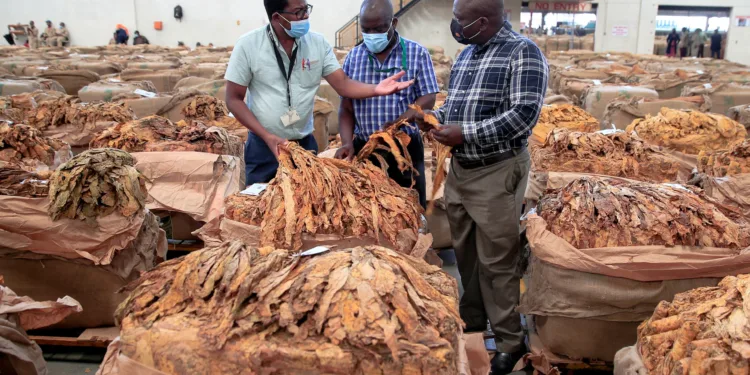Zimbabwe’s Tobacco production is experiencing an unexpected decline that is estimated to be at ten per cent (10%) in the first quarter of the year. Over the years, Zimbabwe has prided itself as the largest tobacco-producing country and the fourth largest in the world.
Africa’s largest tobacco producer began its annual tobacco-selling season with experts and farmers projecting a sharp decline in harvests and quality due to drought.
From a record harvest of 296 million kilograms (326,000 tons) in 2023, the country is estimating that production will fall to about 235 million kilograms (259,000 tons) this season due to harsh weather referred to as El Nino’s intense drought.
El Nino is a natural climate phenomenon in which surface waters of the central and eastern Pacific become unusually warm, causing changes in global weather patterns.
Patrick Devenish, chairman of the Tobacco Industry Marketing Board (TIMB)spoke about the adverse effect of the weather on the quantity and quality at the official opening event in the capital, Harare.
He said,
“Most of our tobacco is grown by small-scale farmers. They depend on the rains, and a drought is not good for their crop,” Devenish said. “The quality of some of the tobacco may also be affected.”
Devenish also revealed that the area where tobacco is being cultivated has a 3% decline which is equivalent to 113,000 hectares in the current season, from a large 117,000 hectares in 2023 due to drought.
Agriculture Minister, Anxious Masuka revealed that about 75% of Zimbabwe’s tobacco is produced by local farmers who cannot finance a good irrigation system.
Zimbabwe Tobacco’s mass production avails the nation the opportunity to export the produce to China as its biggest buyer. Although Western and Eastern Europe and some other parts of Africa remain important markets.
In 2023, the Southern African country received a record-breaking $1.2 billion from tobacco exports, a huge increase from $975 million in 2022, according to the Tobacco Industry Marketing Board.
Tobacco is one of the country’s major foreign currency earners, along with minerals such as gold and many other minerals.
Also read: How Zimbabwe Aims To Become Africa’s Tech Hub
How Does Zimbabwe Export Their Tobacco Products to China And Other Western Countries?
China has played a pivotal role in fueling Zimbabwe’s tobacco surge through the implementation of a grower contract system managed by the state-owned China National Tobacco Corp., the globe’s leading cigarette manufacturer.
The partnership entails the provision of seeds, fertilizers, sustenance, monetary compensation for labour, and timber for curing tobacco to local farmers, who constitute the majority of Zimbabwe’s tobacco cultivators. In return, these farmers are obliged to sell their harvest exclusively to the Chinese company or its designated representatives.
This partnership and contract system finances about 95% of Zimbabwe’s crop which is now also offered by some non-Chinese local and foreign companies.
However, local farmers are complaining that the financing system leaves them in a cycle of debt. The majority of these farmers are unable to get loans from banks due to a lack of collateral.
If the local farmers can’t sustain themselves through this financing system, is this a favourable partnership for Zimbabwe or China?
The Zimbabwean government hoped to increase its harvest to 300 million kilograms (330,000 tons) by the end of 2025 through a government-led tobacco transformation plan adopted in 2021. This plan would have benefited the local farmers and helped them sustain their businesses, but the drought might delay the progress of this plan.
The president of the Zimbabwe Tobacco Growers Association, George Seremwe, who’s representing the local farmers mentioned that “the drought is likely to cost farmers 20% or more of their usual earnings.”
Zimbabwe’s Tobacco production seems to rely largely on the input of local and small-scale farmers.
A tobacco farmer from Madziwa, northwest of Harare, Likephone Makii watched in sadness as one of his bales auctioned at just $1.70 a kilogram because of its poor quality.
Makii, who has been growing tobacco for the last nine years, said he often harvests 6,000-7,000 kilograms (6.6-7.7 tons) from his two-hectare plot but expects only 3,000 kilograms (3.3 tons) due to the weather. This local farmer relies on only rainwater to grow his produce.
In his words, “It has been the toughest season for me and my fellow small-scale farmers.”
Will Zimbabwe’s Tobacco production withstand the drought season?










